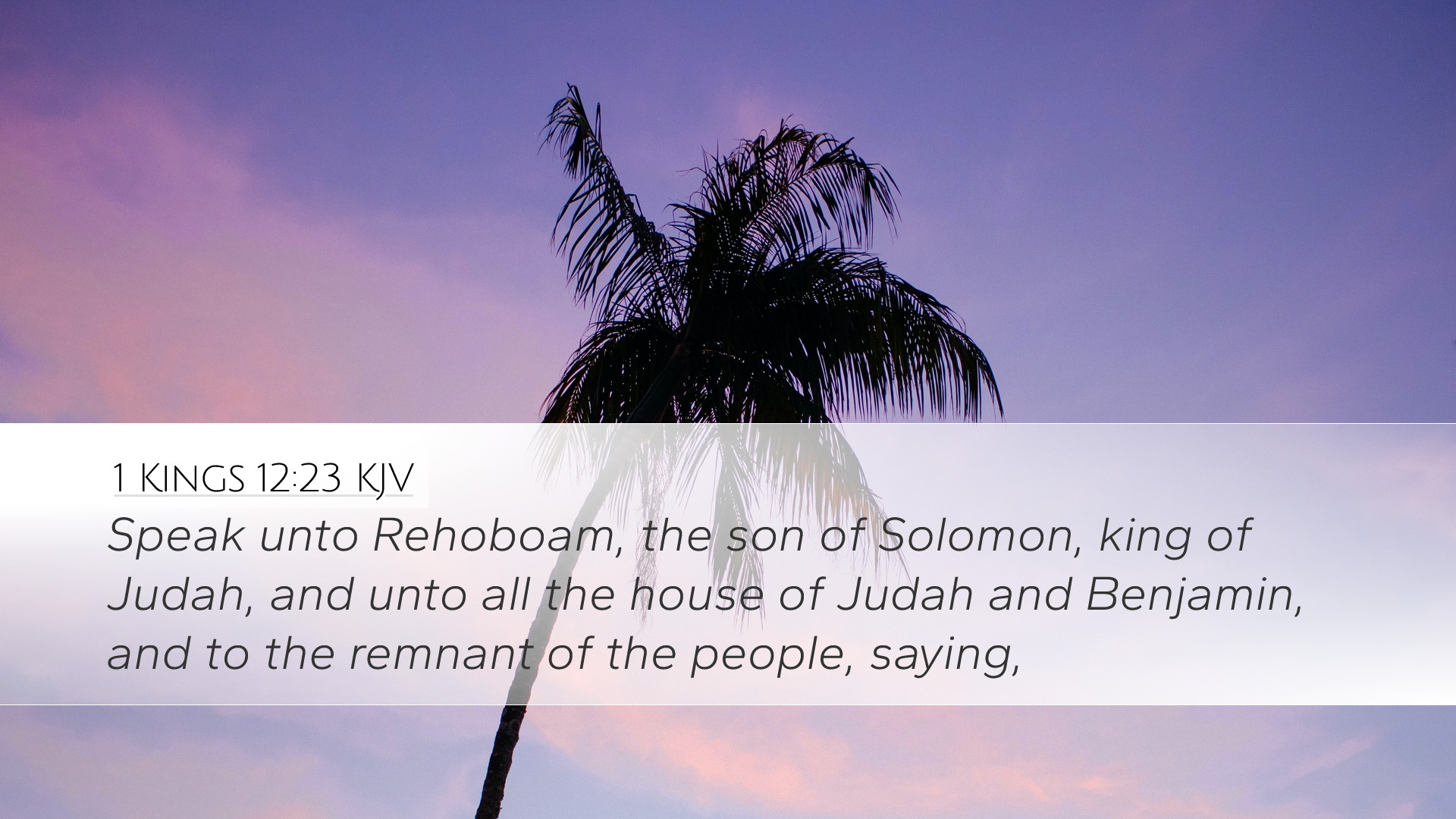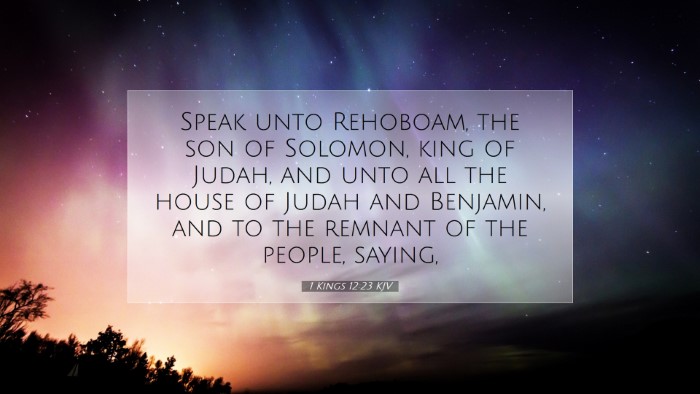Commentary on 1 Kings 12:23
Verse Reference: 1 Kings 12:23 - "Say to Rehoboam, son of Solomon, king of Judah, and to all the Israelites in Judah and Benjamin."
Introduction
This verse marks a significant moment in the history of Israel as it pertains to the divided kingdom. It addresses Rehoboam, the successor of Solomon, emphasizing the crucial decisions faced by the new king in responding to the grievances of the people. To comprehend this passage fully, we will explore insights from renowned public domain commentaries, highlighting the theological and historical importance of this moment.
Historical Context
The division of the kingdom following Solomon's reign was rooted in both political and spiritual issues. Rehoboam's ascension came at a time of unrest, as the heavy taxation imposed by Solomon had left many Israelites in discontent. This context sets the stage for understanding the counsel given to Rehoboam and its implications on Israel's future.
Insights from Matthew Henry
Matthew Henry emphasizes that this moment is not only historical but deeply instructive. He notes:
- Leadership Challenges: Rehoboam's rule symbolizes the trials of leadership, especially when facing the expectations and needs of the populace. His initial actions would set a precedent for future leadership in Israel.
- Listening to Counsel: Henry underscores the importance of wise counsel. The decision Rehoboam would make about how to respond to the request for lighter burdens was pivotal, highlighting the need for leaders to heed both good and bad advice in governance.
- Consequences of Choices: The interpretation of Rehoboam's choices is central to Henry's commentary, noting that poor decisions can lead to dire repercussions, not only for the leader but for the nation as a whole.
Albert Barnes' Perspectives
Albert Barnes offers a detailed commentary that focuses on the dynamics of power and response:
- Rehoboam’s Dilemma: Barnes discusses Rehoboam's precarious position as a ruler, striving to balance loyalty to his father's legacy while addressing the need for reforms demanded by the people.
- The Factions Within Israel: Barnes notes the political fracturing of Israel, suggesting that this division was already evident among the tribes. The request for a kinder rule signifies a larger struggle for justice and equity.
- Cue to Seek Wisdom: He points out that this scenario serves as a divine cue for Rehoboam to seek godly wisdom in his decisions. The subtle reminder that his father, Solomon, had gained wisdom should lead him to a similar pursuit.
Adam Clarke’s Analysis
Adam Clarke provides a deep theological reflection on the passage:
- Theological Underpinnings: Clarke draws attention to the theological significance of leadership in the context of God's covenant with Israel. He underscores that the king acts not just on his own but in a divine representative capacity.
- Prophetic Implications: Clarke also reflects on the prophetic dimensions of this division, indicating that the split of the kingdom was foretold. Rehoboam's actions are integral to the unfolding of God's plan for Israel.
- The Weight of Responsibility: He emphasizes the heavy burden of responsibility resting on Rehoboam's shoulders, noting the constant tension between divine expectations and human actions.
Thematic Considerations
This verse serves as a pivotal turning point in the biblical narrative, encapsulating key themes pertinent to both the historical and contemporary reader:
- Leadership: Effective leadership requires discernment, wisdom, and an authentic concern for those being led.
- Community Dynamics: The relationship between rulers and subjects is complex; leaders must navigate the fine line between authority and compassion.
- Spirituality in Leadership: A leader's reliance on divine wisdom versus secular advice highlights the ongoing struggle in governance, especially in matters that impact faith communities.
- Consequences of Decisions: The idea that choices have consequences is woven throughout biblical history; leaders’ decisions can shape the destiny of nations.
Conclusion
1 Kings 12:23 stands as a rich resource for reflection on leadership, the dynamics of power, and the importance of wisdom in decision-making. Through the insights of Matthew Henry, Albert Barnes, and Adam Clarke, we gain a multifaceted understanding of this pivotal moment in Israel's history. It serves as both a warning and a guide for contemporary leaders, theologians, and scholars as they navigate similar challenges in their own contexts.


